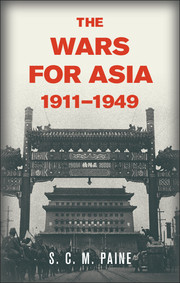Book contents
- Frontmatter
- Contents
- Maps
- Acknowledgments
- Technical Note
- Part I Fear and Ambition Japan, China, and Russia
- PART II Nested Wars
- 5 Flashback to 1911 and the Beginning of the Long Chinese Civil War
- 6 Regional War
- 7 Global War
- 8 The Final Act of the Long Chinese Civil War
- 9 Conclusion
- Chronology
- Notes
- Bibliography
- Index
8 - The Final Act of the Long Chinese Civil War
Published online by Cambridge University Press: 05 September 2012
- Frontmatter
- Contents
- Maps
- Acknowledgments
- Technical Note
- Part I Fear and Ambition Japan, China, and Russia
- PART II Nested Wars
- 5 Flashback to 1911 and the Beginning of the Long Chinese Civil War
- 6 Regional War
- 7 Global War
- 8 The Final Act of the Long Chinese Civil War
- 9 Conclusion
- Chronology
- Notes
- Bibliography
- Index
Summary
一山難容二虎
It is difficult for one mountain to hold two tigers.
(Great rivals cannot coexist.)The global war brought an end to the regional war, but not before the Second Sino-Japanese War had altered the balance in the long Chinese civil war. The long regional war destroyed not only the Nationalist army, but, more importantly, the sociopolitical fabric of Chinese society, which previously had prevented Communist expansion in rural areas. Japanese actions uprooted communities, turned peasants into refugees, and left a political vacuum, which it lacked the capacity to fill. The vacuum created an opportunity, which the Communists recognized and seized. The Japanese military strategy of relentless expansion and brutality catalyzed a countervailing Chinese nationalism. This viscerally anti-Japanese nationalism increasingly united a chronically divided peasantry, the often forgotten force in Chinese politics, whose influence becomes decisive in periods of dynastic change. As General Peng Dehuai told Edgar Snow in 1936, the peasantry required only leadership.
While the Communists recognized and filled the leadership vacuum in rural China, the Nationalists fixated on the illusive pursuit of operational victory that had also consumed the Japanese. Like the Japanese the Nationalists tried to kill their way to power without adequate attention to the sources of allegiance. Japanese military strategy created a nationalistic community increasingly loyal to the Chinese Communist Party as the only political force offering any hope for rural China, where the vast majority of Chinese conscripts lived. In rural and urban areas, the Communists relied on the youth – a neglected group in Confucianism, where youth deferred to age. They harnessed the idealism of the young with a promise of leadership in the vanguard of New China.
- Type
- Chapter
- Information
- The Wars for Asia, 1911–1949 , pp. 222 - 270Publisher: Cambridge University PressPrint publication year: 2012



